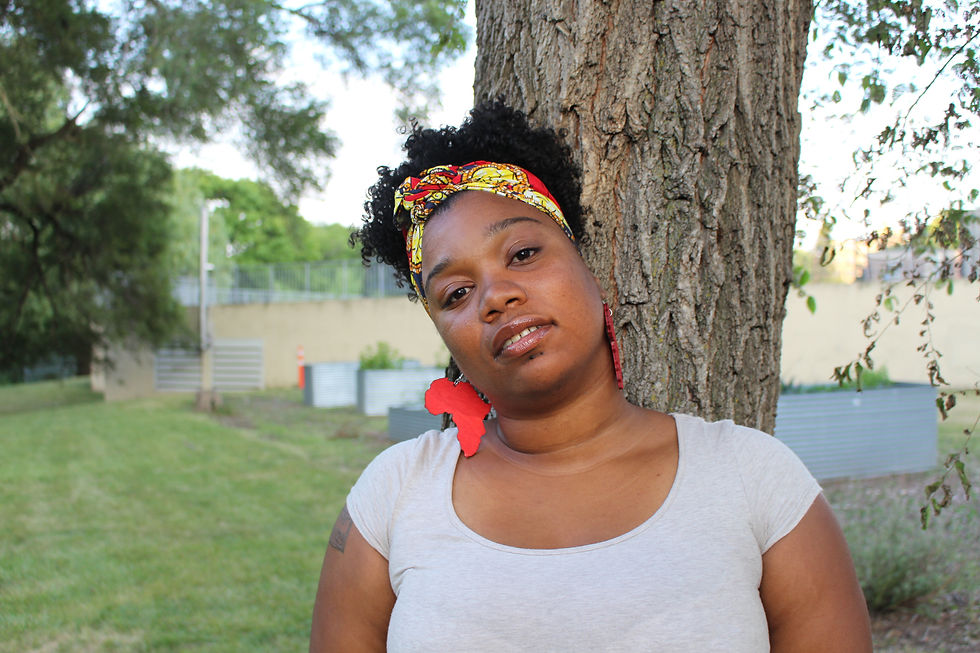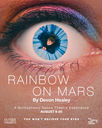QUEEN KUKOYI TALKS AFROFUTURISM, ACTIVIST ART AND THE FEMINIST ART FEST
- Mar 5, 2020
- 5 min read

Queen Kukoyi is a Toronto-based artist.
Interview by Rebeccah Love
What kinds of creative activities did you engage with as a kid?
As a child I mostly wrote poetry and I loved to do intricate doodles; these doodles have evolved into Tribal marking with words that affirm whatever I’m feeling, thinking, or experiencing in the moment.
How did the arts play a role in your teenage years?
I grew up in the Springfield, Massachusetts in the USA, surrounded by racism and a community riddled with violence. Art saved my life as a teenager, especially poetry! I was molested at the age of 14 by my mothers' ex-husband. It went on for two years and he became physically abusive over two years because I would fight scratch and bite him to prevent him from touching me. As he increasingly became more frustrated with my fighting him the sexual abuse moved from touching to physical violence. One day I knew he was going to hit me so I ran out the house with my little brother before he could. He caught up to us and when I tried to escape he punched me several times in front of a store but a pedestrian on a bike saved my life. After the incident I became very isolated, so poetry and drawing became my only outlet to express the pain I was experiencing. I had suicidal ideology but every time I would feel upset or angry I would just draw or write and I would feel better.
What mediums do you engage with right now?
Drawing and poetry evolved into collaging. Which now has evolved into digital collaging and animations, through a Speculative or Afro- futures lens.
Your Instagram features these incredible collages and animations. Would you consider these images to be Afro-futuristic?
I would consider this visual arts and everything I do to be Afrofuturism 2.0, which was developed by Dr. Ronaldo Anderson. I use mindfulness and storytelling to facilitate discourse that decolonizes the Black identity and affirms all intersections of Blackness.
What does Afro-futurism mean to you?
Afro-futurism 2.0 is an exploration and reclaiming, of various black identities through multiple dimensions. It is a meta-analysis convergence of music, art and sciences as performed and lived through intersectional blackness.
Can you tell me the story of how these images came to be?
I want my art to affirm that blackness exists outside of stereotypes, decolonize the people of the African Diaspora so that they don't fit into one ideal. I think it’s so important for us as black people to tell our own stories and reaffirm our own narratives! For so long western culture has told our history and created our identities for us. My hope is to affirm, celebrate and amplify individual black identities told by and lived by black people.
How did you enjoy studying Art and Social Transformation at Ryerson University?
I loved this course taught by Ken Moffet! It help me integrate my community activism work and my art into an outlet for social activism.
What lessons did you take away from that program?
I would say the biggest lesson I took away from the program is that Ryerson is the right school for me to be in. And that my dream to integrate arts and activism is a historical practice.That it is a form of activism and that I can use it as a tool to dismantle and decolonize.
This upcoming March you are participating in the Feminist Art Fest at OCADU. You’ll be screening in the Blxck Womxn film night and speaking on the Resistance, Rematriation and Diasporic Futurity panel. Can you tell me a little bit about this festival?
I’m so excited to be in the festival this is such an amazing opportunity! I’m so happy to have my work viewed by a new audience. I was wary at first when I found out about this festival because my first thought of feminism is that it historically hasn’t including amplifying the voices of black women.
But as I read on in the description of the festival I saw that it wanted to amplify the voices of marginalized and racialized bodies. I am a Black, Queer, Mother, Author, Activist, and Toronto based International Artist. Often times part of my identity are erased because other parts are visible. I’m happy that this gives me the opportunity to speak about all my intersections.
What is the focus of the festival?
I believe the that this festival is to amplify the voices of women of all intersections to reclaim whatever womanhood looks like to them!
What excites you about participating?
In the beginning of the year I told the universe that I wanted to do more speaking engagements. So I am most excited to have a platform to amplify my voice.
Do you currently live in Toronto? If yes, do you find Toronto to be an artist-friendly city?
I do currently live in Toronto and yes I do see it as an art friendly city but that is not often the case for people who look like me.
What does the word ‘community’ mean to you?
When I think of the word community I think of folks with like mine with similar experiences, history, and or ideals.
Is it an important part of your art practice?
Community is a huge part of my art practice because my hope is to create space for dialogue and decolonizing internal and external ideas of the black monolith.
Why is art important?
Art is so important because it gives us the opportunity to make words, feelings and thoughts visual.
What non-visual art forms do you engage with?
I write poetry for myself.
If there was one message you wished to deliver to the whole of Toronto, what would it be?
When black people are free everyone is free. I say this because this idea of equality doesn’t exist here, not for me or anyone that looks like me! It’s 2020 up to a few days ago I experienced racist attacks on my IG page. A few white men claiming they are trying to protect the white race here in Canada were saying that my page is racist and left vague threats in my comments section. When confronted they acted like victims. I was told that I didn’t deserve to be at Ryerson! It is this daily chipping away of my blackness and mental health and I am not alone in my experience!
March 2 the city of Toronto launched Black mental health day and it was completed through the efforts of some brilliant black folks at the city who’ve been fighting to amplify the needs of the black community. Toronto is beginning to make it attempts we are still so far behind. We are only as strong as are most marginalized group.
What are you looking forward to?
I’m looking forward completing my degree and to getting into the Masters program for social work at Ryerson!
Watching my daughter evolve as a photographer and Digital Artist.
I’m looking forward to my first solo exhibit. My goal is to do it this year! So look out for me Toronto!






Comments